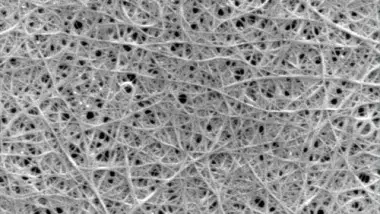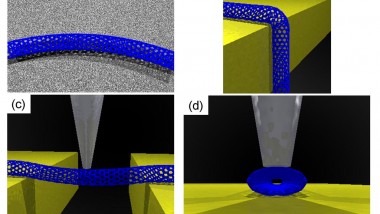Scientists at Sandia National Laboratory in New Mexico have created diamond-like thin carbon films which have now been used in the low energy sensors of the recently launched NASA Interstellar Boundary Explorer (IBEX). The smooth layer of film efficiently ionizes ...
Flexible, Transparent Nanotube-Based Loudspeakers
Researchers from Tsinghua University and Beijing University have recently developed a thin film based on carbon nanotubes (CNT) that could replace conventional magnetic loudspeakers. By applying an audio frequency current through the CNT, the loudspeaker can generate sound with wide ...
Carbon Nano-Tube Color A4 E-Paper
Samsung Electronics and Unidym have demonstrated the world’s first carbon nanotube-based color active matrix electrophoretic display (EPD) e-paper. The revolutionary color e-paper was demonstrated on a 14.3 inch display. The e-paper device jointly completed by Samsung and Unidym uses a ...
Super Strong Antimicrobial Coatings
Virginia A. Davis and Aleksandr Simonian from Auburn University research the role contaminated surfaces have in spreading infections. Their research has led them to seek better antimicrobial coatings. In their latest research project, the scientists combined one of the world’s ...
SuperThread – Strongest Carbon Nanotube Ever
Yuntian Zhu, a Los Alamos scientist, has recently developed carbon-nanotube fibers (CNT) that may prove to be some of the strongest materials on Earth. These CNTs are 100 times stronger than steel (pound for pound for the same weight), tougher ...
Research Team Develops New Nanomotors
Researchers at ASU’s Biodesign Institute in Arizona report the development of a new generation of tiny nanomotors that are up to 10 times more powerful than existing motors. The research team, led by Joseph Wang, director of the Center for ...
Perfecting Solar Cells by Adding Imperfections
Jessika Trancik of the Santa Fe Institute, Scott Calabrese Barton of Michigan State University, and James Hone of Columbia University have recently combined forces toward improving solar cells. Their new research shows that a film of carbon nanotubes may be ...
Carbon Nanotubes for Chemical Detection
Researchers at Rice University and Rensselaer Polytechnic Institute have recently been able to use carbon nanotubes to make the “blackest black” — the darkest material ever created, reflecting only 0.045 percent of all light shown on it. Schematic of a ...
NanoRadio – Smallest Radio Receiver in the World
A group of scientists led by Alex Zettl, a Physicist at the University of California, Berkeley, has developed a nanoscale radio, with a key circuitry consisting of a single carbon nanotube. Today, any wireless device, from cell phones to environmental ...
CO2 Absorption Made Easier
Researchers at the Georgia Institute of Technology (GIT) have discovered a new material capable of absorbing carbon dioxide (CO2) from the smokestacks of coal-fired power plants and other generators of greenhouse gases. According to the scientists, the new substance, which ...








